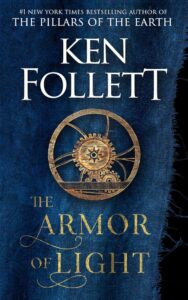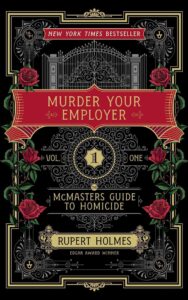On January 1, 2020, I launched www.GreatOpeningLines.com, history’s first website devoted exclusively to the celebration of great opening lines in world literature. After a modest beginning, it is now the world’s largest online database of literary openers, with more than 2,000 entries. If you’re a writer or aspiring writer, an avid reader, or simply a First Words junkie, consider it your “Go-To” site on the subject.
When the site was launched, I commemorated the event by doing a Smerconish.com post on “Twenty of the Best Opening Lines of 2020”. A year later, I followed up with a similar list for 2021. And last year, I provided my selections for 2022. This marks my fourth annual compilation.
It is a truism in the literary world that the purpose of a book’s opening words is to keep the reader reading. In a 2015 blog post, the crime-fiction writer P. J. Parrish nicely expanded on the idea:
“The importance of a great opening goes beyond
its ability to keep the reader just turning the pages.
A great opening is a book’s soul in miniature.
Within those first few paragraphs—sometimes buried,
sometimes artfully disguised, sometimes signposted—
are all the seeds of theme, style and most powerfully,
the very voice of the writer….”
In a 2013 interview with Joe Fassler of The Atlantic magazine, Stephen King offered perhaps the most famous words ever offered on the subject of great opening lines:
“An opening line should invite
the reader to begin the story.
It should say: Listen. Come in here.
You want to know more about this.
How can a writer extend an appealing invitation—
one that’s difficult, even, to refuse?”
Appealing openings can take many different forms, as you will shortly see. I found all of this year’s selections—and many more that didn’t make the final list—not merely difficult to refuse, but almost impossible. Perhaps they’ll have that same effect on you.
(1) KEVIN F. ADLER & DONALD W. BURNES
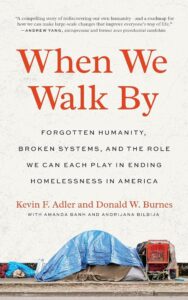
Everyone is someone’s somebody.
When I first read these opening words, I felt as if I’d been slapped on the side of the head. Like a new meme that had taken occupancy in my mind, the impossible-to-forget first sentence reverberated in my thoughts for days.
The words come from senior author Kevin Adler, who was thinking about his uncle Mark—a man who died at age fifty after spending over three decades struggling on and off the streets of Santa Cruz, California.
(2) LOU BERNEY
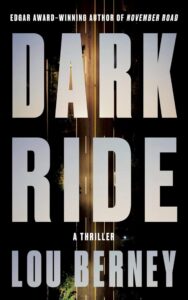
I’m lost, wandering, and somewhat stoned.
The opening words come from narrator and protagonist Hardy Reed, a 21-year-old stoner who, standing in the middle of a city parking lot, loses his bearings while trying to find a local courthouse to process a traffic ticket. He continued with a series of reflections that can only be described as the kind of pot-induced ideation where even mundane aspects of life take on a cosmic significance:
“This parking lot, when you’re in the middle of it, seems much vaster and more expansive than it does from the street. Or do I just seem much less consequential? That’s the question. One for the ages.”
This delightful opening serves as a perfect set-up for an affable underachiever who has no clue his life is about to take a turn for the serious—the deadly serious—when he inadvertently discovers unmistakable signs of child abuse in two children sitting alone on a courthouse bench.
(3) HILA BLUM
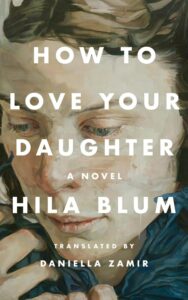
The first time I saw my granddaughters, I was standing across the street, didn’t dare go any closer.
How to Love Your Daughter (2023)
In the opening sentence, our heartstrings have already been seriously tugged—and we will shortly learn the tragic backstory. A middle-aged woman is so estranged from her daughter that she has never been allowed to see her two granddaughters. In a desperate attempt to cope with the enormous emptiness in her life, she goes to great pains to make sure her presence is not discovered as she attempts to catch a glimpse of the girls from afar.
In the novel’s opening paragraph, the narrator—who we will shortly discover is an Israeli woman named Yoella—continued:
“The windows in the suburban neighborhoods of Groningen hang large and low—I was embarrassed by how effortlessly I’d got what I’d come for, frightened by how easily they could be gobbled up by my gaze. But I, too, was exposed. The slightest turn of their heads and they would have seen me.”
(4) HOWARD BLUM
Suppose you wanted to kill someone.
That would be easy. There are lots of ways.
But suppose you wanted to kill four people. All in the same house. All within moments of one another. And you chose to use a knife.
That could help eliminate the noise. But it would require skill, strength, and endurance. Murder is hard work, especially if people fight back.
“The Eyes of a Killer,” in Air Mail magazine (January 7, 2023)
It happens infrequently, but every now and then a magazine article about a recent news event begins with an impressive literary flourish—and that is exactly what we see in Blum’s article about the gruesome stabbing-deaths of four University of Idaho students on November 13, 2022. In the world of journalism, an opener like this is called a lede, and this was one of the best of the year. In his article, Blum continued:
“Then there’s the really big obstacle: you want to get away with it. You’re determined to stab four people living in a single home in the still of the night and then disappear without leaving a clue to your identity. Now that’s a more difficult challenge.
“But you did it. You have everybody stumped. It’s the perfect crime.”
NOTE: After a six-week national manhunt, Bryan Kohberger, a 28-year-old Ph.D. student at Washington State University, was arrested at the Pennsylvania home of his parents. The case is still being adjudicated.
(5) COLLEEN CAMBRIDGE
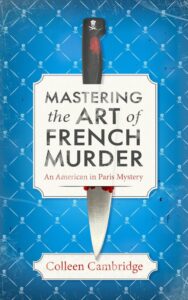
Paris
December 1949
Julia Child had a mayonnaise problem.
Mastering the Art of French Murder (2023)
From the book’s title, it would be natural to surmise that this novel would have a Julia Child connection—and the first sentence confirms that suspicion in a lovely way. The words come from Tabitha Knight, an American woman who is in Paris on an extended stay with her French grandfather. She continues:
“I knew all about it—every sordid detail—because, first, I was one of her closest friends in Paris…well, I wouldn’t be surprised if everyone in the seventh arrondissement—from the Place du Palais-Bourbon to the Tour Eiffel—had heard about the mayonnaise problem. Julia was just that kind of person. She was gregarious and ebullient and giddy and enthusiastic.”
(6) LIZ CHENEY

This is the story of the moment when American democracy began to unravel.
Oath and Honor: A Memoir and a Warning (2023)
It’s rare for the opening sentence of a nonfiction book to be both compelling and historically significant, but that is certainly the case here. Phrased as if the disastrous event has already happened, the line is something one would expect to find in a futuristic novel about a dystopian future.
About Cheney’s opening words, Fred Shapiro, editor of the authoritative New Yale Book of Quotations, said: “Cheney’s riveting first sentence is a deeply sobering summation of the current state of American politics.”
(7) HARLAN COBEN
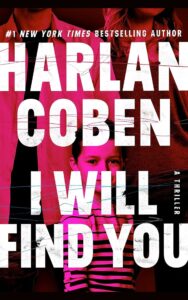
I am serving the fifth year of a life sentence for murdering my own child.
Spoiler alert: I didn’t do it.
In a Good Morning America book launch interview with the author, host George Stephanopoulos said about Coben’s new novel, “This one grabs you on page one,” adding “Once you get to that opening, you can’t put the book down.”
In the novel, narrator and protagonist David Burroughs continued:
“My son Matthew was three years old at the time of his brutal murder. He was the best thing in my life, and then he was gone, and I’ve been serving a life sentence ever since.”
(8) TIMOTHY EGAN
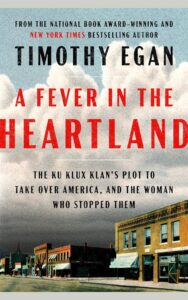
January 12, 1925
The most powerful man in Indiana stood next to the governor at the Inaugural Ball, there to be thanked, applauded, and blessed for using the nation’s oldest domestic terror group to gain control of a uniquely American state.
This dramatic first sentence from the book’s Introduction reads like the opener of an “alternate history” novel, but it is in fact a true-life examination of (1) the pivotal role a Grand Dragon of the Ku Klux Klan played in Indiana history, and (2) how a deathbed confession from a virtually unknown Jewish woman helped bring him down.
In the opening words of Chapter One (“The Birth and Death of the Klan”), Egan—a Pulitzer Prize as well as a National Book Award winner—provided further evidence of his writing chops:
“When white-sheeted nightriders first appeared in the dark Southern night, many people thought they were ghosts. That was the idea: the souls of those who’d died for a republic of slaveholders had returned from their graves. They were out for vengeance, and they were invisible.”
(9) JONATHAN EIG
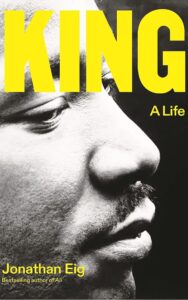
On December 5, 1955, a young Black man became one of America’s founding fathers.
If you’re going to write a major, new biography of the most influential black man in American history, why not start with an inspired first sentence that places him in the pantheon of white men who nearly two centuries earlier founded the country? Eig continued:
“He was twenty-six years old and knew the role he was taking carried a potential death penalty. The place was Montgomery, Alabama, former capital of Alabama’s slave trade.”
(10) KEN FOLLETT
Until that day, Sal Clitheroe had never heard her husband scream. After that day, she never heard it again, except in dreams.
Follett has crafted some memorable opening lines in his career, and it’s nice to see the old master doing it again. In this case, something horrific has happened to Sal’s husband, and there is an unmistakable suggestion that the terrible event has taken his life.
(11) DIONNE FORD
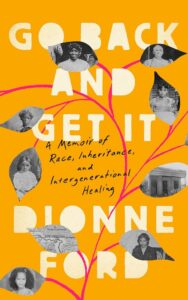
If you are going to look for your enslaved ancestors, you will have to look for the people who enslaved them.
Go Back and Get It: A Memoir of Race, Inheritance, and Intergenerational Healing (2023)
This powerful first sentence is an immediate—and deeply poignant—reminder about a unique experience facing black Americans attempting to trace their roots: they must often look for white people to find their own ancestors. Ford continued with a stark assessment of the situation:
“Any African American can expect that 19 percent of their ancestors were White men. So, the enslavers might also be your relatives.”
Ford’s decision to rigorously research her family history went into high gear on her thirty-eighth birthday, when an internet search led her to a startling family photograph that included her great-great-grandmother and her great-grandmother. Here’s how she described it:
“In 1858, when Colonel W. R. Stuart, a wealthy Louisiana cotton broker, married Elizabeth McCauley, a girl from a long line of North Carolina plantation owners, her family gave the couple a slave named Tempy Burton as a wedding gift. Elizabeth was sickly and couldn’t have children, but Tempy could and did have six of them with her new master, the Colonel. My great-grandmother, Josephine, born a decade after slavery ended, was their youngest child.”
(12) RUPERT HOLMES
So you’ve decided to commit a murder.
Murder Your Employer: The McMasters Guide to Homicide (2023)
Many novels begin with a captivating juxtaposition of antithetical elements—and in this opening sentence we see the horrific crime of murder paired with the low-key normalcy of a study-guide phrase like, “So you’ve decided to learn woodworking.” Things only get better as we continue reading:
“Congratulations. Simply by purchasing this volume, you’ve already taken the all-important first step toward a successful homicide of which you can be proud, one that would gain you the admiration of your peers, were they ever to learn of it.
“This book will see to it that they don’t.”
(13) PAM JENOFF
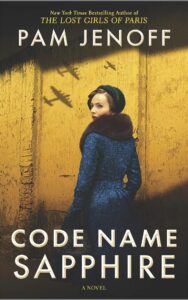
Micheline threw the still-smoldering Gauloises cigarette to the ground and crushed it with the high heel of her black leather boot. Then she marched across the darkened Paris street and grabbed the man she’d never seen before by the lapels, throwing him back against the stained brick wall of the station.
“Kiss me!” she ordered in English, whispering tersely.
The novel’s opening words are filled with intrigue, and they have a film-noirish quality that is easy to visualize in the movie theaters of our minds. As the scene unfolds, we quickly learn that the man in question is an American soldier, and when the mysterious woman whispers in his ear “If you hope to live, follow me!” we eagerly go along for the ride.
(14) ANDREW LELAND
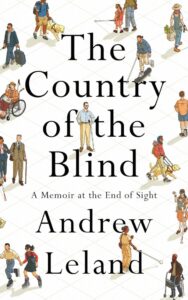
I’m going blind as I write this.
The Country of the Blind: A Memoir of the End of Sight (2023)
These are the stark opening words of a memoir that came out of nowhere in the middle of the year and ended up on numerous “best books of the year” lists. Leland continued:
“It feels less dramatic than it sounds. The words aren’t disappearing as I type. I’m sitting comfortably in the sunroom. The sun is rising like it’s supposed to. I can plainly see Lily sitting next to me, reading in her striped pajamas. The visible world is disappearing, but it’s not in a hurry.”
Leland suffers from retinitis pigmentosa (RP), a progressive eye disease that slowly but inexorably leads to blindness. When the memoir was published, he could see only about six percent of what a person with normal vision sees.
(15) RUTH MADIEVSKY
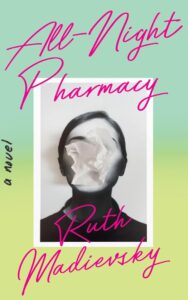
Spending time with my sister, Debbie, was like buying acid off a guy you met on a bus.
A sizzling simile is always a good way to begin a debut novel—and this is a particularly enticing one. The words come from an unnamed narrator, who goes on to explain:
“You never knew if it would end with you, euphoric, tanning topless on a fishing boat headed for Ensenada, or coming to in a gas station bathroom, the insides of your eyes feeling as though they’d been scraped out with spoons. Often, it was both.”
In a Publisher’s Weekly review, Louisa Ermelino wrote: “By the end of the first paragraph of Ruth Madievsky’s debut novel, All-Night Pharmacy…there’s no question you are in for a wild read.”
(16) JAVIER MARÍAS
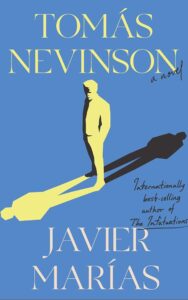
I was brought up the old-fashioned way, and could never have dreamed that one day I would be ordered to kill a woman.
Tomás Nevinson (2021; first Eng. translation 2023)
The opening words come from the title character, a Spanish man who once worked for the British Secret Service. Now retired and living in Madrid, he is approached by his former handler for one last assignment—to go undercover in search of a female terrorist. He went on to add:
“You don’t touch women, you don’t beat them, you don’t do them any physical harm and you avoid all the violence, although in that regard they themselves don’t always hold back.”
In 2015, an article in Scroll.in magazine described Marías as “The best literary start-up artist of the day,” adding, “No reader can stop at the first sentence.” The celebrated Spanish author—who died in 2022—continued his tradition of impressive openers in his final work, a novel that first became available in English in 2023.
(17) CLANCY MARTIN
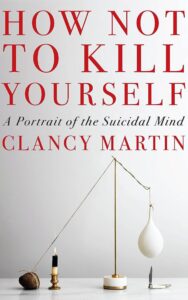
The last time I tried to kill myself was in my basement with a dog leash.
How Not to Kill Yourself: A Portrait of the Suicidal Mind (2023)
It’s a grisly first sentence, true, but it’s hard to imagine a better opening line for a nonfiction book addressed to people who are attempting to cope with suicidal thoughts. After the “hook” has been implanted in readers, Martin—a philosophy professor with a long history of failed suicide attempts—reels them in with the following explanation:
“As usual, I didn’t write a note. I carried down a green leather and wood chair from my office while my dog watched from the stairs. She’s afraid of the basement. I took the heavy blue canvas leash, looped it over a beam, made a noose by snaking the leash through the handle, latched it, and checked it for strength. Then I kicked the chair away like the gentle old institutionalized suicide Brooks Hatlen does toward the end of The Shawshank Redemption.”
(18) LIZ NUGENT
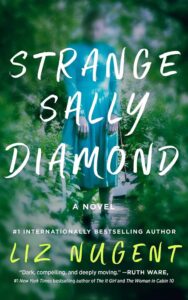
“Put me out with the trash,” he said, regularly. “When I die, put me out with the trash. I’ll be dead, so I won’t know any different. You’ll be crying your eyes out,” and he would laugh and I’d laugh too because we both knew that I wouldn’t be crying my eyes out. I never cry.
No other contemporary crime novelist has excelled Nugent in the crafting of memorable opening lines, and she continues to set a high bar in her most recent work. In a 2023 Guardian article on her own favorite first lines in fiction, Nugent might have had an opener like this in mind when she wrote:
“In my own work, I like to set the opening line in the aftermath of a major event. I write first-person narratives and the reaction of the protagonist to this event should give the reader a good indication of the type of character we are dealing with.”
(19) ALEXANDRA PETRI

It is a truth universally acknowledged that an American billionaire, in possession of sufficient fortune, must be in want of a Supreme Court justice.
“Supreme Court, Consider Justice Sponsorship!” in the Washington Post (June 23, 2023)
Here, Petri ingeniously tweaks one of literary history’s most famous first sentences—from Jane Austen’s 1813 novel Pride and Prejudice—to open an article that satirically suggested the Supreme Court should consider the formal sponsorship of judges, like NASCAR and other sports. She continued:
“Nothing seems to bring billionaires so much simple joy as having a personal justice to accompany them on yacht and fishing trips, flights on their private planes and jaunts to rustic lodges….”
(20) LIXING SUN
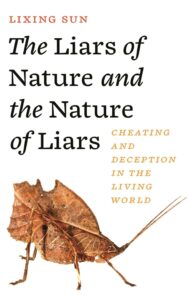
She is pregnant. Raising a child takes a lot of time and energy, yet she is short of both. Homeless, she has no choice but to find somebody else to take care of her baby—for free. It’s not easy, but she knows how to pull it off.
The Liars of Nature and the Nature of Liars: Cheating and Deception in the Living World (2023)
These are the dramatic opening words of one of the best opening paragraphs of the year, and they come not from a novel, but a work of nonfiction. The author, a professor of biology at Central Washington University in Ellensburg, Washington, continued:
“She scouts around and spots a cozy house in a quiet neighborhood. The young wife of the family looks caring and has just given birth to a new baby, so is a perfect choice as a surrogate. She hides herself and waits in the vicinity, keeping watch on the house. Opportunity presents itself when the new mother takes a short trip to get some food. She sneaks in and switches the baby with her own. Then she heartlessly throws the victim’s infant in a dump.”
After describing this scenario as “a cold-blooded murder case,” Dr. Sun went on to clarify that the perpetrator of the crime is a female cuckoo bird who has snuck her own fertilized egg into the nest of a female warbler.
(21) DAVID VON DREHLE
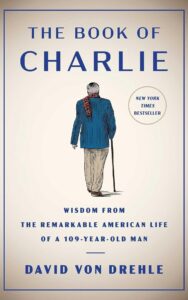
Early one August morning during a heat wave in Kansas City, Mo., I stepped outside to fetch the Sunday newspaper—and something stopped me in my tracks.
“My Neighbor Lived to Be 109. This is What I Learned from Him,” The Washington Post (May 22, 2023)
When I’m in search of great opening lines, I don’t restrict my thinking to the first sentence of the piece, or even the first paragraph, for it sometimes takes a few paragraphs to truly hook the reader. See how that plays out here, as Von Drehle continues:
“My new neighbor was washing a car. In my memory…it was a shiny new Chrysler PT Cruiser, the color of grape soda pop. It belonged to my neighbor’s girlfriend, and I couldn’t help noting that the vehicle in question was parked in the same spot where she had left it the night before. I deduced that a Saturday night date with the glamorous driver had developed into the sort of sleepover that makes a man feel like being especially nice the next morning.
“My neighbor was bare-chested, dressed only in a pair of old swim trunks. With a garden hose in one hand and a soapy sponge in the other, he flexed his muscular chest with each splash and swirl, his wavy hair flopping rakishly over one eye. This was Dr. Charlie White. Age 102.”
Later in the year, Von Drehle told the fuller story about his neighbor in The Book of Charlie (2023). While I thoroughly enjoyed the book, I preferred the way he opened his earlier Washington Post article.
(22) JESMYN WARD
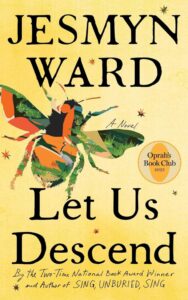
The first weapon I ever held was my mother’s hand.
This first sentence has all the elements of a classic opening line—and I predict that it will be remembered many decades from now. The words come from 12-year-old Annis, the daughter of an enslaved black woman who was raped and impregnated by her white plantation owner. Annis continued:
“I was a small child then, soft at the belly. On that night, my mother woke me and led me out to the Carolina woods, deep, deep into the murmuring trees, black with the sun’s leaving. The bones in her fingers: blades in sheaths, but I did not know this yet.”
As the story unfolds, we learn that Annis’s grandmother—known as Mama Aza—was a famous female warrior in the West African nation of Dahomey. Sold into slavery by her husband, the king of Dahomey, for falling in love with a soldier, she ended up on a plantation in North Carolina. Mama Aza passed along her warrior training methods to her daughter, and now, Annis’s mother is about to continue the tradition by going deep into the woods to train her daughter in the hand-to-hand combat skills of her ancestors.
(23) KATIE WILLIAMS
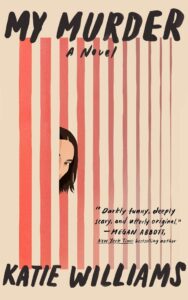
I was supposed to be getting dressed for the party, the first since my murder.
Stories narrated by dead men talking—and increasingly by dead women as well—have long been a staple of film noir (think Sunset Boulevard and D.O.A.), but Katie Williams, a professor of fiction writing at Boston’s Emerson College, takes the genre in a whole new direction in her nifty new work of speculative fiction. In a Daily Mail book review, Christena Appleyard wrote, “The first sentence is an absolute cracker.” The opening words come from a young mother named Lou (from Louise), the recent victim of a serial killer. Without giving too much away, Lou and five other victims have been brought back to life by a government agency called The Replication Commission. The recently revived victims form a kind of survivor’s group, and—well, you’ll have to discover the rest for yourself.
As I pointed out in my previous posts, I don’t regard the selections above as the best opening lines of 2023, but rather as twenty-three of the very best. My selections reflect my tastes and preferences, and a similar list created by you would almost certainly be considerably different. While I’ve sampled over five thousand books, I’ve only dipped my toes into the massive ocean of books published this past year. If I’d been able to examine several thousand more, some of the entries above would’ve likely been replaced by even better ones.
If you failed to find your favorite opening lines from 2023 in this post, there’s a good chance you might find them at www.GreatOpeningLines.com. And if you cannot find them there, please e-mail them to me at [email protected]. I’ll make sure they get posted on the site.
See you next year.
Mardy
 Dr. Mardy Grothe is a retired psychologist and author of eight quotation anthologies, including Oxymoronica and I Never Metaphor I Didn’t Like (for more, go to: www.drmardy.com). The compiler of “Dr. Mardy’s Dictionary of Metaphorical Quotations” (DMDMQ), he also publishes a weekly newsletter on Substack (drmardygrothe.substack.com).
Dr. Mardy Grothe is a retired psychologist and author of eight quotation anthologies, including Oxymoronica and I Never Metaphor I Didn’t Like (for more, go to: www.drmardy.com). The compiler of “Dr. Mardy’s Dictionary of Metaphorical Quotations” (DMDMQ), he also publishes a weekly newsletter on Substack (drmardygrothe.substack.com).




